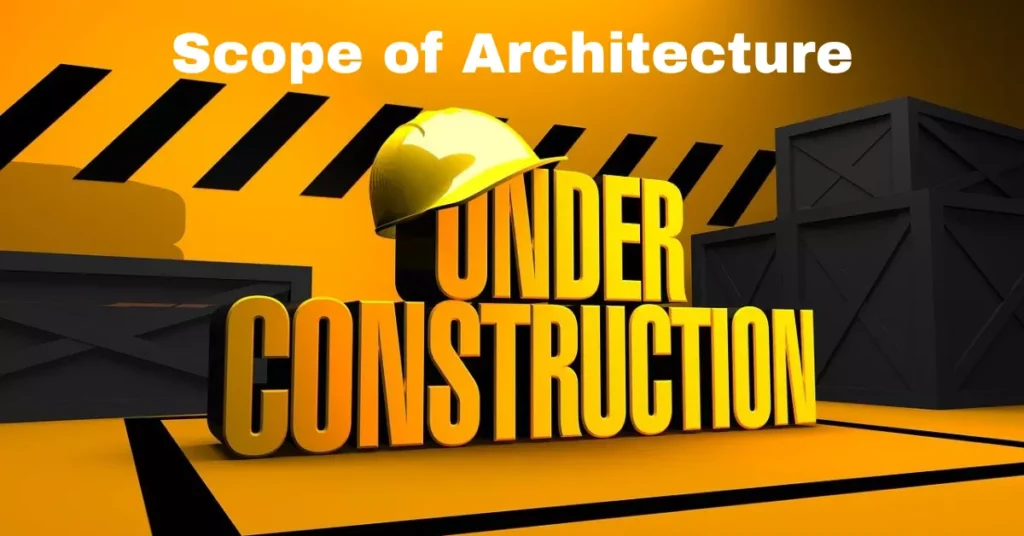Scope of Architecture in Pakistan presents a dynamic landscape ripe with opportunities and innovation. From its definition to the diverse career avenues it offers, this article explores the scope, career paths,

required skills, and educational avenues in the realm of architecture. Discover the evolving trends and lucrative prospects awaiting aspiring architects in Pakistan.
Career Path in Architecture
Entering the world of architecture in Pakistan opens up a realm of diverse career paths and exciting prospects. Let’s break down what it takes to thrive in this field.
1. Job Prospects in Pakistan
Architects in Pakistan have a wide array of opportunities awaiting them. From designing intricate residential spaces to shaping the commercial landscape, the scope is extensive. Roles as residential architects, commercial architects, civic architects involved in public projects, conservation architects preserving heritage, and industrial designers pushing boundaries—these roles showcase the breadth of possibilities.
2. Salary Insights
The monetary aspect is always a key consideration. Salaries for architects in Pakistan vary based on experience, expertise, and the type of projects undertaken. Entry-level positions might start modestly but grow significantly with experience and expertise. The range is broad, offering room for growth and lucrative prospects.
3. Required Skills
To excel in architecture in Pakistan, certain skills are essential. In the field of design, it is essential to possess an imagination, for creating spaces skills in drawing and drafting talent, for conducting thorough research, and the ability to provide exceptional customer service. Working collaboratively and having an understanding of mathematics and physics are also aspects of this profession.
The fusion of these skills lays the foundation for a successful career in architecture in Pakistan.
Understanding these facets not only sets the stage but also ignites the curiosity to explore deeper into the world of architecture in Pakistan.
Educational Landscape in Pakistan
When it comes to pursuing a career, in architecture the educational path plays a role. In Pakistan, there are opportunities, for aspiring architects to sharpen their skills and obtain the required qualifications.
1. Top Universities for Architecture
There are universities, in Pakistan that have architecture programs. Institutions, like [University Name] [Another University Name] and [One More University Name] are widely recognized for their curriculum experienced faculty, and modern facilities. These universities not only offer education but also prioritize practical learning through hands-on experiences.
Read also please: Scope of Environmental Science in Pakistan: Career & Jobs
2. Available Degrees
Within these institutions, a spectrum of degrees in architecture is available. Students have a variety of options when it comes to their education ranging from bachelor’s programs that provide a foundation to specialized master’s degrees that explore specific areas in depth. These courses encompass aspects such, as design principles, architectural history, sustainable practices, and technological advancements all of which play a role in shaping architects, with well-rounded skills.
Subject Courses for Architecture Career Opportunities:
The field of architecture provides a selection of courses that cater to different career paths. These courses cover areas such, as design, the history of architecture structural systems, sustainable design, urban planning, and more. By studying these subjects students gain the knowledge to succeed in their chosen area of specialization, within architecture.
If you’re considering a future, in architecture it’s important to research the universities and programs to find the fit for your educational goals and career aspirations.
Having an understanding of the options will provide a strong starting point for embarking on a successful architectural journey, in Pakistan. This knowledge will empower individuals to make informed decisions and pave their path toward their desired careers.
Becoming an Architect in Pakistan
Becoming an architect, in Pakistan requires a combination of education, qualifications, and practical experience. Let’s take a look, at the requirements and skills needed to succeed in this profession.
1. Essential Qualifications
To enter the field of architecture certain qualifications are necessary. You must have a bachelor’s degree, in architecture from an institution, as a foundation. Furthermore gaining knowledge through master’s programs or certifications can enhance your expertise in specific areas of architecture.
2. Necessary Experience
Beyond academic qualifications, practical experience holds significant value. Gaining experience through internships or apprenticeships, at firms is crucial for aspiring architects. These opportunities provide a chance to work on projects applying knowledge in practical settings. This hands-on experience plays a role, in shaping architects into rounded professionals.
3. Work Environment
Architects in Pakistan often find themselves in diverse work environments. Architects work in environments, including design studios and, on-site project locations. Their daily routine involves collaborating with colleagues meeting clients drafting plans and engaging in brainstorming sessions.
These activities are integral to the life of an architect. Provide insights for those aspiring to excel in the architectural field, in Pakistan. It’s not just about the academic qualifications but also about the practical experiences that mold architects into visionaries of space and design.
Diverse Architectural Careers in Pakistan

In Pakistan, the field of architecture goes beyond creating structures. It involves a range of tasks and duties that focus on different aspects of design and construction.
1. Roles and Responsibilities
#1: Building Architect: These architects focus on creating functional and aesthetic spaces, considering structural integrity and design aesthetics.
#2: Interior Designer: They craft interior spaces, blending functionality and aesthetics to create inviting and practical environments.
#3: Town Planner: Responsible for urban development and land use planning, ensuring sustainable and organized city layouts.
#4: Landscape Architect: Designers who shape outdoor spaces, harmonizing nature and human intervention to create beautiful landscapes.
#5: Interior Architects: They delve into the finer details of interior spaces, ensuring cohesion and functionality in every aspect.
2. Specialized Fields in Architecture
Architects in Pakistan can specialize further based on their interests. Whether it’s sustainable architecture, historic preservation, or futuristic design using advanced technology, specialization offers avenues to delve deeper into specific niches and contribute uniquely to the field.
Understanding these diverse roles allows individuals to explore the multitude of career paths available in the realm of architecture in Pakistan. It’s not just about buildings but about the artistry and functionality interwoven into various aspects of design and construction.
Architectural Opportunities in Pakistan
The field of architecture in Pakistan is a canvas teeming with possibilities, offering various career paths and burgeoning opportunities waiting to be explored.
1. Career Paths and Options
- Expansive Scope: Architects in Pakistan have a broad canvas to paint on, from designing homes and commercial spaces to shaping public infrastructure. The scope spans across sectors, offering versatility in career choices.
- Emerging Avenues: With advancements in technology and a growing emphasis on sustainability, new avenues like green architecture, smart cities, and innovative design approaches are gaining traction, providing exciting prospects for architects venturing into these domains.
2. Emerging Opportunities
- Urban Revitalization: The ever-evolving cities of Pakistan present a canvas for architects to contribute to urban renewal projects, revitalizing spaces and preserving heritage while embracing modernity.
- Sustainable Design: As sustainability takes center stage globally, architects in Pakistan have a significant role in creating environmentally conscious designs, fostering a balance between development and preservation.
Understanding these opportunities not only highlights the diverse avenues but also instills a sense of excitement for budding architects in Pakistan, showcasing the limitless possibilities to make a meaningful impact through their designs and innovations.
Read also: Scope of Educational Psychology: Complete Guide
Conclusion: Scope of Architecture in Pakistan
The architectural scene, in Pakistan beautifully blends elements with ideas creating a platform for architects to blend history, culture, and modernity. This field offers a range of opportunities from designing spaces to reimagining urban landscapes showcasing its dynamic nature.
Aspiring architects in Pakistan find themselves at the threshold of a profession filled with possibilities, where creativity and functionality intersect. Their designs have the potential to shape the future of our nation.
Embracing this evolving landscape opens up prospects for architects to become pioneers, in shaping Pakistan’s architectural narrative.
FAQs:
Architects in Pakistan can earn well with experience. Entry-level salaries might start modestly but can grow substantially with expertise and projects.
Currently, architects specializing in sustainable design, urban planning, and those skilled in smart technology integration are among the most sought-after.
Yes, architecture is in demand in Pakistan. The growing urban landscape and emphasis on modern infrastructure continually require skilled architects for innovative designs.
Yes, architecture is a respected career. Architects shape our environment, contributing creatively and technically, earning admiration for their design prowess.
The required percentage for admission to architecture programs in Pakistan varies but often ranges from 50% to 60% in intermediate or equivalent exams.
AI aids architects but won’t replace them. Architects bring creativity, empathy, and contextual understanding AI can’t replicate, crucial in design and client relationships.

